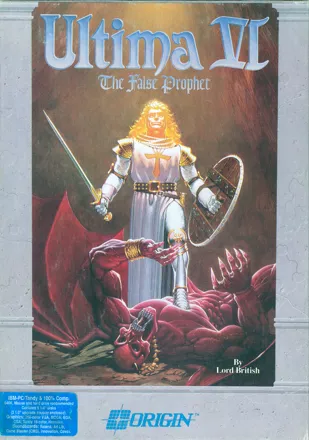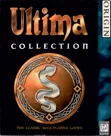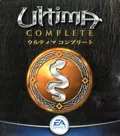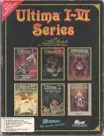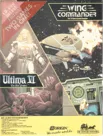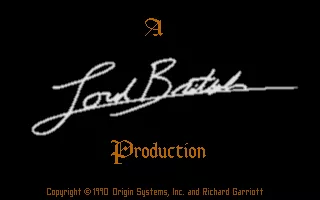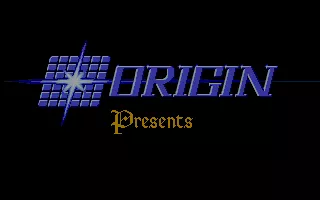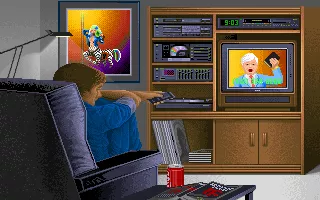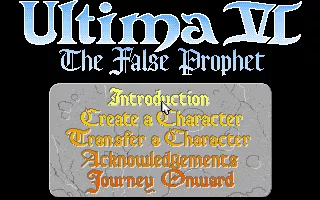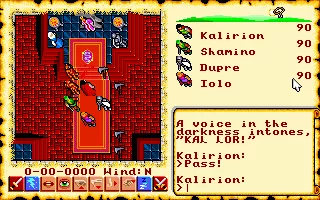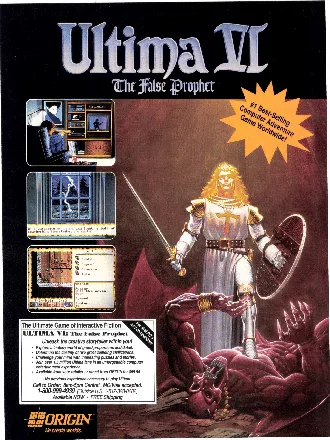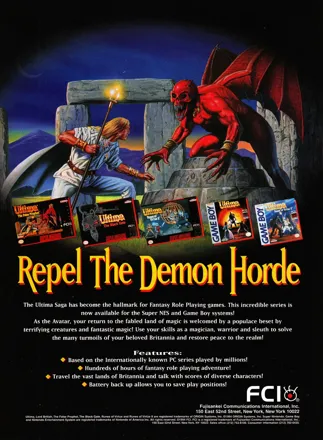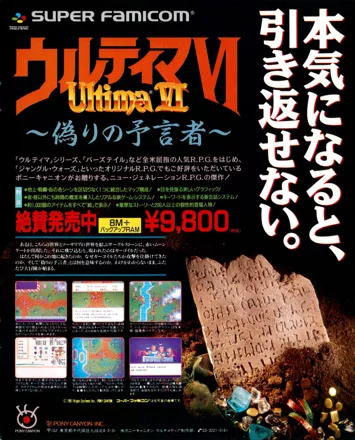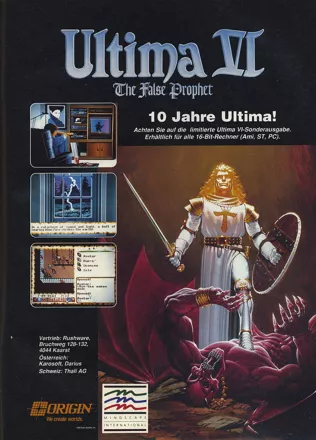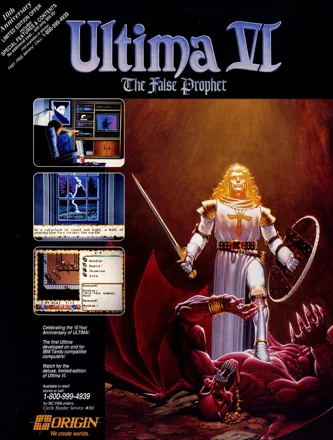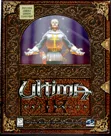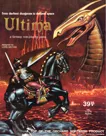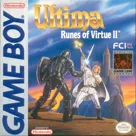Ultima VI: The False Prophet
Description official descriptions
Several years after having restored Lord British to his rightful position as the monarch of Britannia, the Avatar is captured by demon-like creatures and placed on a sacrificial altar. His friends Iolo, Shamino and Dupre appear just in time to save him. In the Britannia castle, the Avatar learns that his abductors were gargoyles, a race of enigmatic creatures who have recently invaded Britannia and occupied the shrines of Virtue. As the Avatar embarks on a quest to liberate Britannia, he begins to gain insight into the gargoyles' true motives, and realizes that it is his duty to achieve peace and understanding between the two races.
Ultima VI is notable for having a fully continuous world. There is no "world map" in the game; all the locations are seamlessly connected to each other, turning the game world into an open environment. Compared to the previous installments in the series, the game focuses more on quests and exploration rather than on combat. The latter no longer involves separate screens; battles occur during exploration, without any transitions. The turn-based system from the previous games has been preserved.
The interface has been re-designed, the original key-bound commands co-existing with selectable command icons and mouse-based interaction. The game world is more detailed than in the previous games, with a large number of various objects that can be manipulated or added to the inventory. Conversations are more extended, with a wider selection of topics, including many personal ones unique to specific characters. The player is also able to conduct extensive conversations with the Avatar's companions, as well as split the party and control the characters separately. Some important topics may be highlighted during text display, to facilitate further dialogue, which requires the player to type the desired conversation topics.
Like in the predecessors, the player is free to explore the game world from the beginning of the game, and visit locations in any order. Following the main quest and obtaining specific items and information is necessary to complete the story; however, the player can also opt to bypass a large part of it by using previous knowledge of the game or outside help. The FM Towns version has full voice acting for all the conversations, in English and in Japanese.
Spellings
- ウルティマVI 偽りの予言者 - Japanese spelling
- 創世紀6 - Chinese spelling (traditional)
Groups +
- Animals: Mice / Rats
- Console Generation Exclusives: SNES
- Fantasy creatures: Dragons
- Fantasy creatures: Trolls
- Gameplay feature: Character development - Automatic leveling
- Gameplay feature: Character development - Training
- Gameplay feature: Day / night cycle
- Gameplay feature: Fishing
- Gameplay feature: Gambling
- Gameplay feature: Horse riding
- Gameplay feature: Hunger / Thirst
- Gameplay feature: Importable characters
- Gameplay feature: Karma meter
- Gameplay feature: Mining
- Games with manual lookup copy protection
- Physical Bonus Content: World Map
- Protagonist: Female (option)
- Sound Engine: MED
- Ultima series
- Ultima universe
Screenshots
Promos
Credits (DOS version)
38 People · View all
| Executive Producer | |
| Programming | |
| Sound | |
| Design | |
| Graphics / Artwork | |
| Music | |
| Packaging | |
| Documentation | |
| [ full credits ] | |
Reviews
Critics
Average score: 86% (based on 36 ratings)
Players
Average score: 3.8 out of 5 (based on 116 ratings with 7 reviews)
the right compromise between Ultima 4-5 and Ultima 7. Probably the best Ultima
The Good
AAAhhh.... my chance to review one of my favourite games.
Foreword: I completed this (right when it came out, at the times of Amiga!), then I completed U7 and U7-SI ten years later, and then took a look on U4 and U5, which I liked a lot but didn't complete 'cause I already knew the story from U6 game and manual.
Reading other players reviews, I realize that there seems to be a U4-U5 clan, opposite to a U7 clan, and not too many people care about U6. U4 fans say that U6 lacks of atmosphere, and U7 fans say that it lacks of graphics, items and so on. Well: in my opinion, this is a fantastic game, and maybe the one to recommend to anybody that has never played an Ultima game.
I heard more than one say that the plot of U5 is more fascinating. Ok I cannot reply, since I didn't complete that game; but the story of U6 is really good, and it has something to teach: tolerance. You understand once more that what seems to be evil is often just a bit different, and may have a lot to teach and a lot to share with you.
And I loved the fact that everything becomes clear just near the end of the game (despite what happens in U7, where everything is quite obvious since the early game - and this is the worst thing about U7).
graphics shouldn't be too important while reviewing a game like this; anyway, I think that having the whole world map on a unique scale is a big conceptual step ahead from U4-U5, where the main map was only symbolic, and cities where just icons on it. It brings really a lot more fan to the exploration.
Moreover, the true good thing to say about this game is: everything works well. You are brought into a damn real living world, with very accurate dialogues, and you get a lot of fun just walking around.
The interface is perfect, I'd say - less friendly than U7 interface, but more realistic and useful. Ok I won't repeat myself , so if you wanna know why U7 is a step back from U6 for me, just read my U7 review.
U4 is famous for its total-non-linearity. Ok, U6 has a story behind it, and it's more linear. But it's far from being totally linear (see U7): since the beginning, you can choose among various things to do (gathering informations about the book of prophecy, starting to follow the main plot, or seeking a way to cleanse the shrines, or knowing more about the gargoyles in battle). In each of the eight cities you have to find a rune of virtue, which is simple in certain cities and difficult in others. Anyway, these are 8 things you have to do and you can do them in any order. Proceeding with the game, you get to look for 8 different map pieces, having only a vague idea about their locations, and again you can find them in any order. I mean: ok the plot is somehow linear, but it splits in different non-linear tasks in more than one occasion.
The Bad
Everything is ok. maybe they could have put some more puzzles of the kind "use this item on that place", since there are only 2-3 of them (apart from using keys), and the rest of the tasks (pratically 99 percent) are exploration tasks.
The Bottom Line
You have the freedom of U7 without its silly plot and its stupid inaccuracies. You have the charme of U5 without playing an only symbolic exploration of Britannia. What more? As I said, the right compromise. And having played previous and next ultima games, now I understand why Ultima fans wouldn't rate this as the best of the series, since they are bond either to U4 or to U7. But there's no doubt: if you've never played Ultima and you want to play only one of the nine, you have to play this - definitely.
DOS · by Emanuele Borinato (10) · 2004
A stunning RPG based game, Ultima VI is top of the line. Best of the Ultima series!
The Good
This was my first Ultima game I've played and probably the first true RPG game with a 3rd person perspective. Ultima VI is one of those games that really embedded a significant influence on me that I will always regard as "the good ol' days".
A very user friendly game for those who have never played RPG games or the Ultima series before. It has a very good if not great story line. Ultima VI and probably other Ultima games kind of bring a sort of virtual reality where a kid and his computer game always wanted to be a hero of some sort...to actually be a hero in all those games he's been playing. The intro portrayed that fantasy, you in front of your computer being summoned out of know where suddenly being recognized as an Avatar - which means in Hindu Mythology the embodiment of a God in human form.
You really don't have to know much about the previous Ultima games to play this game. The story plot kinda gives the story where its been a hundred more years since your last return, so your practically a myth (everyone in Britannia are immortals in the sense that they don't die of old age) so some character from the previous Ultima games may recognize you.
The flexibility of the adventure gives you time to explore to your own leisure. This game has numerous puzzles, most have nothing to do with the story line to finish the game, but those were probably the best ones. Despite that the walkthrough is actually provided in the manual, it still doesn't stop you from playing the game if not only thrills you more. It's probably because everyone hates being stuck while playing a game. They trusted you enough to give you a detailed walkthrough of the game, considering that there's a lot of things you can do aside from the main plot.
The motto of Origin Systems is "We create worlds". That's one company I know that lived up if not more to that concept. The world of Britannia is astounding. It's not just background graphics when you walk around. You can explore (by foot) the whole damn continent. Every once in a while you find a cave or abandoned house with magical items and stuff which make exploring a top priority. Even great modern RPG's like Arcanum or Baldur's Gate doesn't come close to the freedom of game play. They're too much stuck with the main plot. In Ultima VI, the main plot is just a mini quest. It doesn't introduce you to a new story line that changes the whole story like modern day RPG's, Ultima VI totally depends on your discreation. When and where is totally up to you. There's no such thing as a wrong move or action that destroys the chances of a perfect ending. That reasurrance has a very nice feel of security.
One of the greatest features that made Ultima VI a game to remember is item management. I have never seen a game before that had the total freedom to manipulate items with so much freedom. Almost every item available can be used even though some are useless, like chairs. You can either sit or move them, but at least you can manipulate them, they're not just an immovable object in most games. The fun part of this feature is the puzzle solving that has to do with objects. The developers did they're best to try to hide secret doors by putting objects in front of them to hide. Everytime you see a room but see know door, your compelled to find out where the entrance is...moving objects around, practically re-arranging everything to find that one secret door.
The plot has one of the best moral embedded stories I've ever seen. It's about the evil of human ignorance and prejudice. Which is portrayed by the fear of the local populace towards the "demon-looking" gargoyles portrayed as the evil of the land. Even one of the best RPG games I've played: Final Fantasy VIII lacks the "moral story", as it's more into romantice scenes.
I don't know how the developers did it, if there was one game that taught a child about everything to be a Paladin or champion of goodness. This game would be it. This game babysits kids better than most humans I know.
The Bad
Besides the occasional "bugs", there were some puzzles that I haven't solved, which was kinda annoying - and was not in the manual (the prophecy).
The manual doesn't provide the non-story puzzles. Other than that, it was pretty much...perfect!
The Bottom Line
If you want to know the Ultima series better, this is a great place to start!
Say hello to Sherry the mouse for me, I'm gonna miss her!
This review is dedicated to Shamino, Iolo and Dupre. The best companions from UItima an RPG fan could ever wish for.
Thou art the Avatar. Thou shall triumph and good shall prevail!
DOS · by Indra was here (20735) · 2007
The Good
This was a good game, but a definite let down from Ultima V. For me, the good Ultimas began with IV and ended with VI. I to III are kinda interesting as historical footnotes while VII to IX are modern nightmares.
If you can't tell yet, I'm an Ultima fan (or was). Heck, I can read 'em runic symbols faster than you can say, "Abracadabra!" Beginning with IV, Ultima worked its magic on me. I really was made to feel like an avatar on a noble quest when I was playing IV and V. But while VI's sound and graphics were superior to V's on an absolute level, the combined effect did not draw me into the world of Britannia as much as V (or even IV). I don't know what happened from V to VI, but VI became just another RPG. Good, but not great.
The Bad
For the first time since Ultima IV, the charm of Ultima was broken.
The Bottom Line
Read my review for Ultima V, it's all there.
DOS · by Yeah Right (50) · 2000
Discussion
| Subject | By | Date |
|---|---|---|
| Happy 30th Anniversary! | The Fabulous King (1332) | Jun 2, 2020 |
| Isometric perspective | SharkD (425) | Dec 29, 2007 |
Trivia
Dialogues
In dialogs, key words can be identified for as they were highlighted in the text. However, this was only possible for EGA (and later) graphics. In CGA graphics (or similar) key words were not highlighted, thus adding additional difficulty in guessing which the key words were.
Extras
The game came with a map of Britannia printed not on paper, but on cloth. The quality of this material enhanced the realism of the world you got into when playing this game. A "moonstone" also came with the package. It was a smooth, black stone.
FM-Towns version
The FM-Towns version of Ultima VI has full voice acting, both in English and in Japanese. The English voices were mostly provided by the designers, programmers and family members of Origin, including Richard Garriott in the role of Lord British.
Innovation music board
One of the only games to support the Innovation ("SID" chip) music board.
Intro
In the game's introduction, the time displayed on the VCR is taken from your computer's system clock - in other words, it displays the correct time in-game. Also, you can change the channels using your numeric keypad.
Pacifist walkthrough
Of the Ultima games, VI is the only one which allows you to win without a single fight, no cheating necessary. The Moonstone that you start off with transports you to different places in the game, so that all is required to finish are a few jumps to characters crucial to winning the game, and saying the right dialogue words to them. Learning the places and those words without outside-game knowledge(from a previous play or walkthrough), however, requires completing the rest of the game.
References
ORIGIN founder Richard Garriott has always had a bit of a grudge against Trip Hawkins, co-founder of Electronic Arts, because he didn't like their treatment as an EA affiliated label. Not only did he name a mausoleum after him (Pirt Snikwah backwards) in his Britannia Manor (a house in Austin, Texas, designed and used for creepy real-life RPG's), but, more related, he also made him appear in Ultima VI as pirate Hawkins. Captain Hawkins is portrayed as a cruel man who was eventually murdered by his crew and his tombstone says "Here lies Captain Hawkins. He died a hard death and he deserved it." A few members of his crew are also named after EA employees: Alastor Gordon (Bing Gordon), Bonn (Stewart Bonn) and Old Ybarra (Joe Ybarra).
Re-release
In 1992, Origin re-released this game and chose GT Interactive as the distributor. It came in a smaller box and contained a paper map and Compendium book.
Seggallion
One of Avatar's possible companions, a knight named Seggallion, is in fact an important character in Origin's earlier RPG, Knights of Legend. In that game, the player's main objective was to rescue the imprisoned Seggallion from the evil lord Pildar. Seggallion tells Avatar that he is from the parallel world Ashtalarea (which is the world in which the events of Knights of Legend take place). He further explains that he accidentally stepped into a moongate and was teleported to Britannia.
SNES version
There are a few changes in the SNES version: * The character creation was completely removed. * There are many changes in dialogues and text, mostly replacing or removing all black humour, vulgar language or just words Nintendo doesn't like. * All blood effects were removed. * Killed enemies disappear instantly, dropping their inventory on the ground. * Civilians can't be attacked. * The magic spells "Trap", "Summon", "Slime" and "Eclipse" were removed.
A detailed list of changes can be found on schnittberichte.com (German).
Special Edition
As Ultima VI was published in 1990, ten years after the original Ultima (on the Apple II), Origin sold a special edition of the game to players who pre-ordered it directly from them. The special edition box was autographed by Lord British and included an audiocassette interview with him. There was also a contest in which players whose box contained a metal rune instead of the usual moonstone could have their name appear in a future Ultima.
Ultima 6 Online
An unofficial MMORPG, Ultima 6 Online or U6O, has been developed and released permitting free party-based multiplayer realtime adventuring (with spells, quests and scripted NPCs) in Ultima 6's distinct flavour of the world of Britannia (from its geography down to the look and feel of the sprites). Check out http://ultimasixonline.thezogcabal.com/ to investigate the server status, download the latest version of the client and see which players are currently online!
The Ultima 6 Project
On July 5, 2010, a group of Ultima fans, Team Archon, released The Ultima 6 Project, a remake of the original Ultima VI: The False Prophet as a Dungeon Siege mod. Not only a graphical update, the project also adds an alternative plot, an in-game journal and compendium, and a dialog system similar to the ones of Ultima VII and VIII.
A link to the project's page can be found in the related links section.
Awards
- Commodore Format
- January 1992 (Issue 16) - Cf's all time Top Ten Essential Mega Games* Computer Gaming World
- April 1992 (Issue #93) – Introduced into the Hall of Fame
- November 1996 (15th Anniversary issue) - #44 on the 150 Best Games of All Time list
- Power Play
- Issue 01/1991 - Best RPG in 1990 (DOS version)
Information also contributed by Adam Baratz, Alaedrain, Indra was here, James Hofmann, Jeanne, Nathan Taylor, Olivier Masse, PCGamer77, Pseudo_Intellectual, Rabbi Guru, Sciere and Ye Old Infocomme Shoppe
Analytics
Related Sites +
-
Nuvie
If you have an original copy of "Ultima VI: The False Prophet", you can use Nuvie to run it on modern systems. -
The Ultima 6 Project
Homepage of the remake of Ultima VI with the Dungeon Siege engine. -
Ultima Dragons
An Ultima fan group; this is their main website
Identifiers +
Contribute
Are you familiar with this game? Help document and preserve this entry in video game history! If your contribution is approved, you will earn points and be credited as a contributor.
Contributors to this Entry
Game added by Aaron Grier.
Atari ST added by ZZip. Sharp X68000, FM Towns added by Terok Nor. PC-98 added by Unicorn Lynx. Amiga, Commodore 64, SNES added by Jeanne. Windows added by eWarrior.
Additional contributors: Unicorn Lynx, Jeanne, Apogee IV, monkeyislandgirl, Pseudo_Intellectual, LepricahnsGold, mmasias, Paulus18950, Alaedrain, Patrick Bregger, FatherJack.
Game added May 2, 1999. Last modified February 18, 2025.


